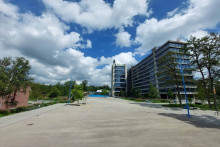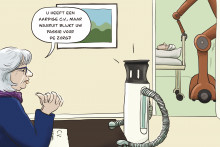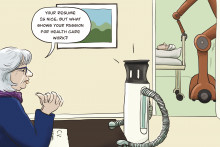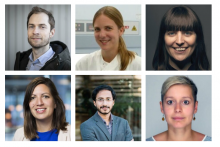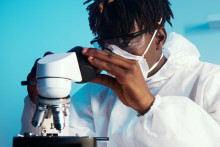What drives and motivates people in their work? That question intrigues Janssen. ‘For my doctoral research, I examined informal mentoring relationships (between a mentor and a protégé) on the work floor. To stay motivated, professional relationships have to satisfy three needs: autonomy, competence and connectedness. Is someone given enough room to do their work as they see fit? Is the work sufficiently challenging? Does it give rise to valuable relationships with colleagues? Whenever I spoke to employees as part of my research, their answers boiled down to these three basic needs.’
The introduction of robots on the work floor makes these three needs newly relevant. These robotic colleagues may affect employees’ autonomy, competence and connectedness. ‘In the context of my research, I am interested in robots that work together with people. The main question is how robotization affects our three basic needs. How do people feel about working with this new technology? I distinguish between social and non-social robots.’
'People are creatures of habit. They tend to be critical of any organizational changes.'
To study the new relationships that arise on the work floor, Janssen will tag along with employees of various organizations. ‘I combine observations and interviews. In general, people are creatures of habit. They tend to be critical of any organizational changes. This will be no different when robots are introduced in an organization. Perhaps a robot does reduce our autonomy. However, when given the chance, employees will undoubtedly structure their work differently to satisfy their need for autonomy in some other manner. On top of that, these technological assets can take care of all manner of tedious jobs, leaving more time for work that actually interests us. Robots will change an organization, but the culture on the work floor will partly determine how robots are implemented and utilized.’
For her research, Janssen does not look at robots that completely take over a person’s job. ‘I am interested in the collaboration between man and technology. Take a robot in a production environment, for example, where it can take care of the heavy lifting or execute tasks that require a great deal of precision. Afterwards, a human employee can take over again. I do not believe that robots will ultimately take all our jobs. A lot will change on the employment market, but jobs for humans will never run out. Any technological innovation always creates new jobs.’
Our ‘Rising Star’ Suzanne Janssen
2008 Master of Science (MSc), Organizational Communication
2008-2011 Lecturer, University of Twente
2015 PhD (Cum Laude) ‘A Self-Determination Theory Perspective on Mentoring Relationships at Work’
2015 - now Assistant Professor in Organizational Communication, University of Twente
2017 Visiting Researcher, AIT Austrian Institute of Technology GmbH
2018 NWO VENI Grant
Prefer print? You can also read this story in our latest Science & Technology Magazine. Grab a copy on campus.



